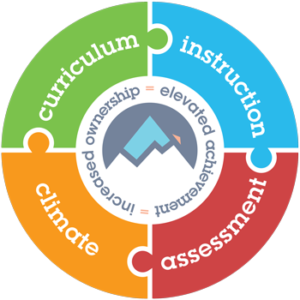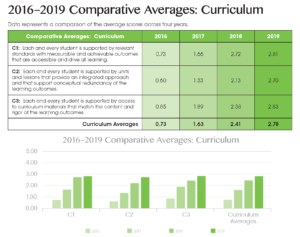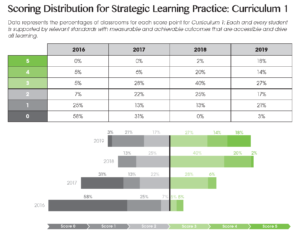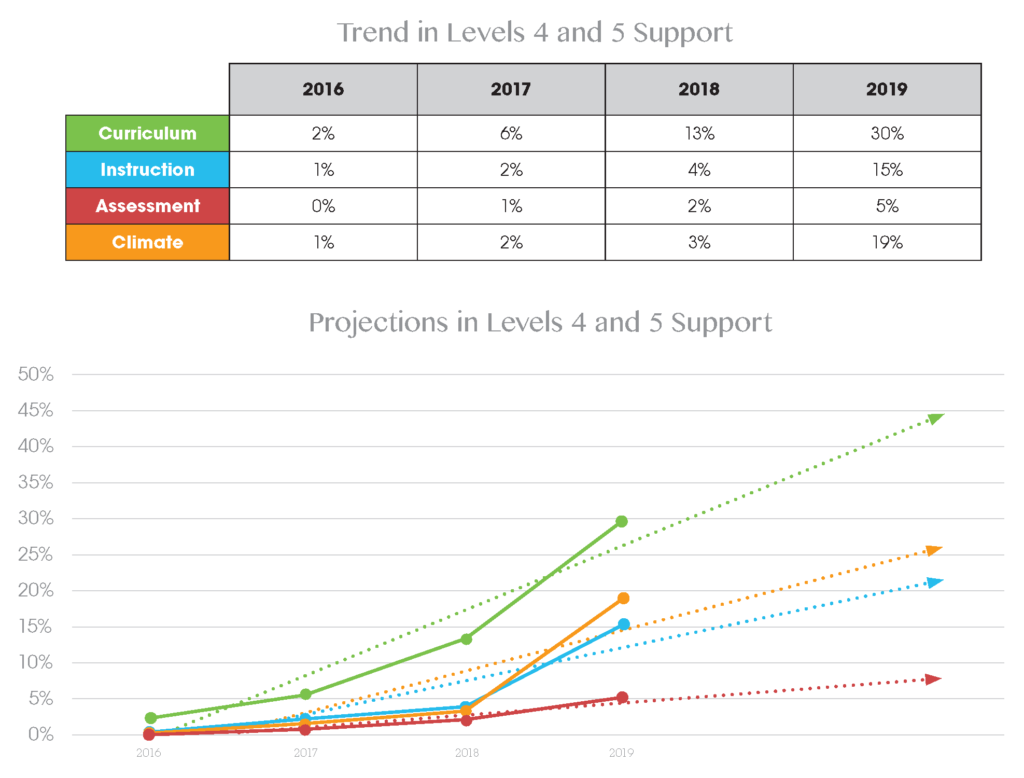Share this article.
True success in education requires that students go beyond just doing or understanding school—they must own their learning. Students who own their learning can state what they are learning and why, explain how they learn best, articulate when they are learning and when they are struggling, and understand their role in any academic setting. This means giving all students the authority, capacity, and responsibility to own their learning.
That’s why we at Elevated Achievement use Academic Climate Reviews to provide school leadership teams with a student-centric analysis of the supports in place in their school. We do this by collecting data on the components necessary to elevate student achievement. These components include: curriculum, instruction, assessment, and climate. We then compile the data in the form of a published report and work with school leadership to articulate and implement a common set of goals for learning and academic achievement.
Why Do You Need an Academic Climate Review?
In our experiences with schools and districts, we have found that most educational systems routinely have all of the four critical components (curriculum, instruction, assessment, and climate) in place. Typically, however, these components are not clearly defined by all stakeholders, are not properly or fully integrated with one another, and are often “pushed” out to students rather than being driven by student needs.
Elevated Achievement’s goal and outcome in an Academic Climate Review is to ensure that:
- each component is clearly defined by all stakeholders,
- each component is integrated with the others, and
- the application of each component is student-driven.
We do this because we know that when adults intentionally develop and control the conditions of success for these four critical components, all students can and will make elevated achievement gains.
What Happens in an Academic Climate Review?
An Academic Climate Review (ACR) is not an evaluation of individuals, but rather an aggregate picture of student supports provided in a school. Each ACR is composed of 3 steps:
- Gather the classroom data that is focused on the student supports provided in curriculum, instruction, assessment, and climate.
- Compile the classroom data into a report that identifies strengths, weaknesses, trends, and projections.
- Report the findings and recommendations for next steps in developing student ownership.
Step 1 begins with utilizing Elevated Achievement’s Strategic Learning Practices™ to collect data about the student supports being provided in each classroom. This is done using a scoring rubric and a data collection tool. Each component is measured against a 6-point rubric with a 5 being the highest score and a 0 representing that the observable actions were not present.
During Step 2, the classroom data is taken from the data collection tool and compiled into a comprehensive analysis. This analysis provides averages and the scoring distribution for each of the Strategic Learning Practices™. As seen in the examples below, the analysis is displayed through the use of charts, graphs, and anecdotal data findings in the printed report booklet.
Step 3 begins with a presentation of the findings by Elevated Achievement to the school leadership team along with the printed report. This is followed by a collaborative discussion about identified strengths, weaknesses, trends, and projections, ultimately leading to a determination of next steps and articulated initiatives for elevating student achievement.
An Academic Climate Review by itself is valuable in providing a data-driven snapshot of where a school is and where it needs to go to ensure students are owning their learning. However, it can be much more powerful when used annually to monitor the progress of goals and initiatives. Let’s take a look at how a school has utilized and benefitted from annual ACR’s.
The Academic Climate Review for Lincoln Heights High School
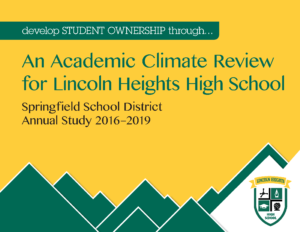 Elevated Achievement’s partnership with Lincoln Heights High School (LHHS) began in the fall of 2016 when we provided their first Academic Climate Review. We continued our partnership into the 2019–2020 school year with annual Academic Climate Reviews and additional professional development support as determined by the LHHS’s principal and school leadership team.
Elevated Achievement’s partnership with Lincoln Heights High School (LHHS) began in the fall of 2016 when we provided their first Academic Climate Review. We continued our partnership into the 2019–2020 school year with annual Academic Climate Reviews and additional professional development support as determined by the LHHS’s principal and school leadership team.
In the fall of 2019, Principal Muriel Reyes was in the fifth year of her tenure at LHHS which serves approximately 1,500 students. Throughout her tenure, Principal Reyes worked to build a leadership team focused on not only elevating student achievement but also on solidifying systems and structures to sustain continuous academic growth. There was a continued emphasis each year on ensuring all instruction is guided by achievable, standards-based outcomes. Specifically for the 2019–2020 school year, the school-wide focus was on accountability with the following three initiatives:
- Teachers will provide opportunities for meaningful engagement where instructional time is used efficiently.
- Teachers will use data to monitor current understanding and provide feedback.
- Teachers will create a respectful academic environment that recognizes and promotes each student.
With the aforementioned goals in mind, Principal Reyes and her leadership team focused on the supports that are necessary for all students to succeed. The leadership team also identified key performance practices upon which to measure change and growth. Using the necessary supports and the key performance practices as criteria, the team continued to identify current strengths and gaps.
Elevated Achievement assisted the LHHS leadership team in this work, by collecting and analyzing four years of data in this Academic Climate Review.
Trends and Projections for Lincoln Heights High School
Four years of data confirmed that Lincoln Heights High School students continue to increase their ownership not just in a specific content area, but across all academic subjects because LHHS educators were delegating more and more authority, capacity, and responsibility to the students. Because the school utilized an Academic Climate Review on a yearly basis, they were able to track the growth across time, remain focused on key factors that led to this growth, and consistently address gaps.
During the period from November 2016 to November 2019, Lincoln Heights High School had a continued and clear focus on curriculum to ensure students are supported with standards-based learning. Each year they provided additional and varied supports to teachers to ensure a continued emphasis on focused, standards-based learning outcomes. Thus, it was no surprise that the school saw its greatest improvements in the area of curriculum with an overall average gain of 2.05 from 2016 to 2019. And, because of the integration between curriculum, instruction, assessment, and climate, and their school focus on these components, we found trending increases for each of the other three components as well.
In 2019 a second type of trend was identified. This showed a notable increase in the percentage of classrooms scoring at levels 4 and 5 from 2016 to 2019. Using this data to make projections, it was clear that if the school continued to utilize the Academic Climate Review to track growth across time, remain focused on key factors that have led to this growth, and consistently address gaps, the percentage of classrooms scoring at higher levels will continue to increase at an accelerated rate.
Recommended Next Steps for Lincoln Heights High School
Based on the data reflected in this report, LHHS continued to focus on instruction and climate with an additional emphasis on assessment. Before transitioning from in-person instruction to virtual instruction during the spring of 2020, it was clear that LHHS students were making gains in their ownership of their learning. Educators were delegating more and more authority, capacity, and responsibility to the students by implementing more student-centric supports at higher levels.
Due to the COVID-19 pandemic, it was not possible to conduct an Academic Climate Review during the 2020–2021 school year. But when we resumed our process in November 2021 the data indicated that even though they were mostly online, students were still receiving supports in curriculum, instruction, assessment, and climate at similar levels to November 2019. Although the 2021–2022 school year showed a drop, there was clear evidence that the knowledge and skills of the work from 2016–2019 remained, and students benefitted. In other words, the framework for elevating student achievement that LHHS had put in place helped decrease learning loss due to online learning, supported students and teachers through a challenging time, and empowered students to own their role in a time of chaotic learning.
Continue the Learning
Check out these articles and resources to continue your learning about this topic…
The Learning Brief
In this article you learned…
- What an Academic Climate Review is and how it supports student ownership of learning.
- How an Academic Climate Review is conducted, compiled, and reported.
- How a school has utilized multiple years of Academic Climate Reviews to drive student achievement and stop learning loss caused by the pandemic.
Can you imagine building an environment full of motivated, engaged, and eager students who own their learning?
We can.

